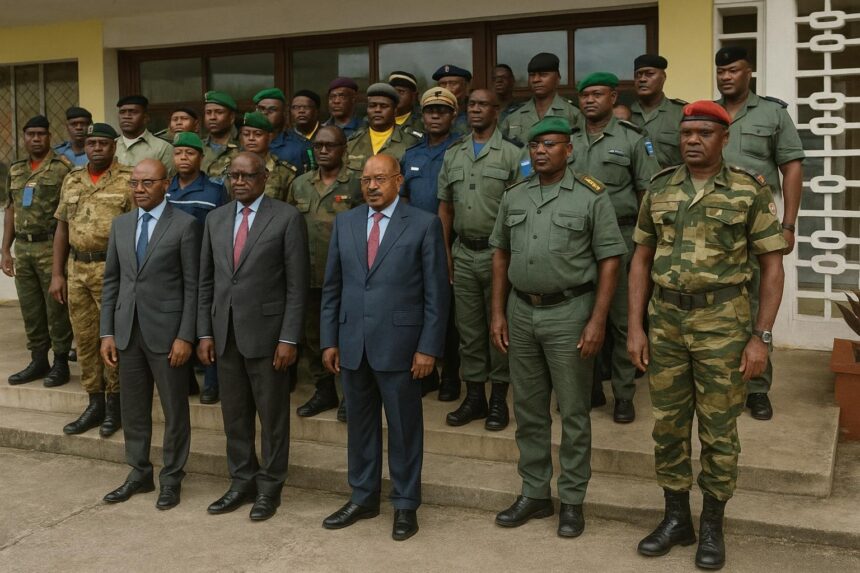MANECO-6 Military Exercise Overview
From drones whirring over simulation screens to cadets rushing between command tents, the sixth Military School Maneuver, code-named “Tambo”, turned the usually quiet campus of Djiri’s Marien-Ngouabi Military Academy into a buzzing battlefield.
In ten intense days between 22 and 31 August 2025, 353 Congolese and foreign trainees practised joint operations against hypothetical armed groups trafficking across a turbulent border, a scenario echoing security concerns shared by governments throughout Central and West Africa.
The exercise, formally titled Maneuver School Edition Six, capped the 2024-2025 academic cycle of the academy’s command and staff courses, leadership applications and basic officer instruction, anchoring classroom theory in field realism.
Minister of Defence Charles-Richard Mondjo, flanked by Armed Forces Chief of Staff General Guy Blanchard Okoï and Schools Commander General Charles-Victoire Bantadi, toured tactical posts on 30 August, publicly signalling political support for training programmes designed to keep the republic’s defence posture credible.
A Simulated Border Under Siege
Under the scenario, a mixed-forces group had just recaptured a border zone riddled with illicit traffic and sporadic violence, yet still faced residual hostiles allegedly helped by elements inside an unnamed neighbouring state, reflecting the complexity of modern asymmetric threats.
Command teams had to synchronise army, air, naval, police, gendarmerie, customs and forestry units, enforcing Congolese law across rivers, savannah and forest corridors that mirror the country’s diverse terrain.
Planners drew on hypothesis seven of national defence doctrine, which covers serious threats to public order and state continuity, ensuring that every tactical decision remained anchored in approved strategic guidelines.
International Classroom in Djiri
Nine partner nations, from Benin to Togo, sent officer trainees, reaffirming the academy’s reputation as a regional hub and offering participants diverse operational perspectives.
“We share rivers and borders; security lessons must also be shared,” said Colonel-Major Jean-Pierre Bouka, the deputy commander who oversaw the drill, arguing that the friendships formed in classrooms often translate into smoother real-world coordination during multinational peacekeeping or anti-smuggling missions.
Foreign cadets exchanged tactics for riverine patrols and desert convoy escorts, experiences unavailable in some Congolese units yet increasingly relevant as regional climate shifts open new trafficking routes.
Digital Network Debuts
A standout feature of 2025 was the first operational test of the academy’s new intranet, linking battle labs, classrooms and field posts through secure fibre and radio relays.
Major Christine Ngoma, an instructor in cyber-operations, explained that the system cuts message delivery from minutes to seconds, giving commanders a real-time common picture and reducing the risk of friendly-fire in complex terrains.
Observers from the ministry’s digitalisation department monitored bandwidth and encryption performance, gathering data for a planned nationwide defence communications upgrade slated to roll out in phases.
Training Objectives and Outcomes
According to General Bantadi, the final desired effect was simple yet demanding: ensure every trainee could analyse a fluid situation, decide under pressure and coordinate across services without confusion.
After-action reviews highlighted improvements in joint planning but noted the need for additional night-flying hours and more robust medical evacuation drills, lessons that course directors say will shape next year’s curriculum.
Officials expressed satisfaction that communications between customs and military units, traditionally siloed, improved markedly during the simulation, offering a template for real border posts along the Sangha and Kouilou rivers.
Government Support and Public Perception
Minister Mondjo praised the cadets’ “discipline and spirit of innovation”, telling reporters the exercise proves that investment in training remains a cornerstone of the President’s national development plan for security.
Local media outlets broadcast extracts of the closing film, and social networks carried supportive comments from families proud to see relatives in uniform, reinforcing civil-military bonds that policymakers view as essential for stability.
Analysts from nearby universities note that transparent communication about exercises helps counter misinformation in an era where rumours can cross borders faster than patrol boats, making public briefings an integral component of modern defence strategy.
Looking Forward
With MANECO-6 wrapped, planners already draft scenarios for 2026, aiming to integrate unmanned aerial systems and expanded medical teams, while the academy’s digital backbone is expected to connect to regional allies, deepening cooperation forged during the August heat in Djiri.
Economic Dimension of Security
Experts reminded attending journalists that secure borders also protect trade corridors vital for Congo-Brazzaville’s non-oil diversification, especially agricultural exports moving toward Atlantic ports and mining inputs arriving from neighbouring hinterlands.
Customs Director Guénolé Mbongo Koumou said streamlined cooperation with the army during MANECO-6 will help speed clearance procedures in real life, cutting logistical costs for businesses while denying smugglers the delays they exploit.
Academic Integration
The academy’s research wing plans to feed data gathered during the maneuver into upcoming theses on joint doctrine, ensuring that lessons are not only practised but peer-reviewed, a step applauded by university partners.
Student officer Nadia Loubaki summed up the sentiment while packing her maps: “It is exhausting, but you leave knowing you can trust the systems and the people next to you.”






















